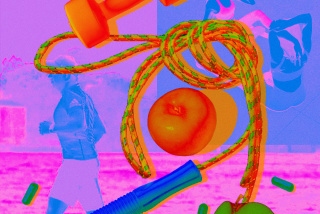Opinion: Sorry, you butter, steak and fat lovers: It really IS about what you eat
To the editor: The oped by Nina Teicholz was misleading and full of contradictions, but what can one expect from the author of a book titled, “The Big Fat Surprise: Why Butter, Meat and Cheese Belong in a Healthy Diet.”
(Re: “Butter, steak and coconut oil won’t kill you,” Opinion, July 23)
She calls herself an “investigative journalist” and not a medical professional. Nevertheless, she refers to “a growing number of researchers, including myself.”
She disagrees with the American Heart Assn.’s conclusions on the harmful effects of saturated fats in relation to heart attacks, strokes and other “cardiovascular events” and then later in the article states, “It’s still possible that a very large, long-term clinical trial could ultimately demonstrate that saturated fats cause cardiovascular death, or even premature heart attacks.”
Huh? Didn’t you just say — oh, well, forget it.
The United States has one of the highest rates of per capita meat consumption in the world. And what else does this country have? An epidemic of obesity, diabetes, cancer, heart attacks and strokes. Coincidence?
Meat, dairy, soft drinks full of high fructose corn syrup, etc., are not part of a “healthy diet” by anyone’s standards.
Carlos Carrier, Long Beach
::
To the editor: Teicholz claims that longstanding bias, commercial interests and a need to reaffirm decades of advice is behind the American Heart Assn.’s recent presidential advisory that dietary replacement of saturated fats from dairy and meat with polyunsaturated fat from vegetable oils reduces cardiovascular disease risk.
She claims that AHA examined only four clinical trials and disregarded other data. But 10 trials were examined; only four were of sufficient quality for a pooled analysis of the data.
Teicholz accuses AHA of “cherry-picking” studies. But cherry-picked evidence is what to watch out for in her book promoting butter, meat and cheese consumption.
William M. London, Westlake Village
The writer is a professor of public health at Cal State Los Angeles.
::
To the editor: The outrageously headlined opinion piece perpetuates confusion that could affect the health of millions. Despite recent food trends, clear and consistent scientific evidence shows saturated fat from a variety of sources can raise LDL (bad) cholesterol.
For heart health, the American Heart Assn. continues to urge people to limit saturated fats to less than 5%-6% of total calories consumed. For someone eating 2,000 calories a day that’s about 11 to 13 grams of saturated fat.
More importantly, the AHA recommends focusing on a heart-healthy “pattern” of eating, rather than on individual components. This pattern emphasizes vegetables, fruits and whole grains; includes low-fat dairy products, poultry, fish, beans, nontropical vegetable oils and nuts; and limits sodium, sweets, sugar-sweetened beverages and red meats.
For nearly a century, the AHA has promoted the premier peer reviewed science-based guidance. The only special interests we serve are those of the American public.
Ravi Dave, M.D., Los Angeles
The writer is past president of the American Heart Assn., Los Angeles County Division
::
To the editor: Nina Teicholz correctly criticizes the biases and financial arrangements of the American Heart Assn., the medical science community and our government in condemning eggs, butter and beef for the cardiovascular epidemic. We still live in a morass of misinformation on what constitutes healthy nutrition.
Whom can we trust for the truth? Simply stated, eliminating processed foods (loaded with sugar), sodas and juices, ingesting adequate protein and good fat (unsalted tree nuts, avocados, tuna, salmon, sardines) will lead to better health.
And remember to exercise.
Jerome P. Helman, M.D., Venice
Follow the Opinion section on Twitter @latimesopinion and Facebook
More to Read
A cure for the common opinion
Get thought-provoking perspectives with our weekly newsletter.
You may occasionally receive promotional content from the Los Angeles Times.






